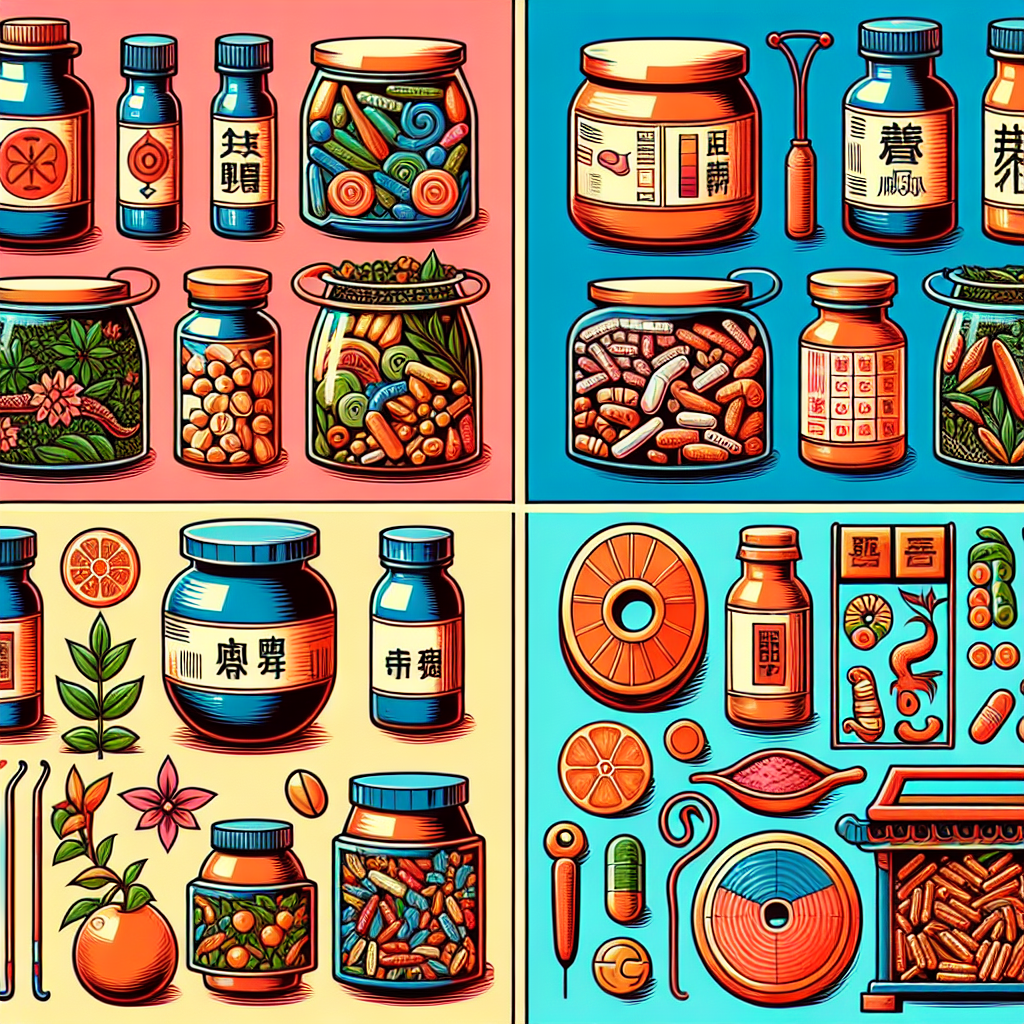Vitamins in Ayurvedic and Traditional Chinese Medicine

Discover the power of vitamins in Ayurvedic and Traditional Chinese Medicine. Unleash your body’s potential for healing and wellness. Visit My Vibrant Vitality now to learn more.
Exploring the Role of Vitamins in Ayurvedic Medicine
Vitamins play a crucial role in maintaining our overall health and wellbeing. They are essential for various bodily functions, including growth, digestion, and nerve function. While modern medicine has made significant strides in understanding the importance of vitamins, traditional systems of medicine, such as Ayurveda and Traditional Chinese Medicine (TCM), have long recognized their value.
Ayurveda, a 5000-year-old system of natural healing that has its origins in the Vedic culture of India, places a strong emphasis on the prevention of disease and the promotion of health. It does this through a holistic approach that includes diet, lifestyle, and herbal remedies. Vitamins, in Ayurveda, are not seen as isolated entities but as integral components of food and herbs that contribute to overall health and wellbeing.
In Ayurvedic medicine, the concept of ‘Rasa’ or taste is used to understand the therapeutic action of foods and herbs. Each of the six tastes – sweet, sour, salty, bitter, pungent, and astringent – is associated with specific health benefits. For instance, sweet foods are considered nourishing and are a good source of vitamins A, B, and C. Sour foods, on the other hand, are believed to stimulate digestion and are rich in vitamins C and A.
Ayurveda also recognizes the importance of ‘Agni’ or digestive fire in the absorption and assimilation of nutrients, including vitamins. A balanced Agni is essential for maintaining optimal health. If the Agni is weak, even the most nutritious food will not provide its full benefits. Therefore, Ayurvedic practitioners often recommend dietary and lifestyle changes to strengthen the Agni and enhance the body’s ability to absorb vitamins and other nutrients.
In addition to diet, Ayurveda also uses herbal remedies to supplement the intake of vitamins. For example, Amalaki or Indian gooseberry, a key ingredient in many Ayurvedic formulations, is a rich source of vitamin C. Similarly, Ashwagandha, a popular Ayurvedic herb, is known for its high content of vitamin B and iron.
Like Ayurveda, Traditional Chinese Medicine also recognizes the importance of vitamins, albeit in a different context. TCM views health as a balance of Yin and Yang – two opposing but complementary forces. Vitamins, in TCM, are seen as vital substances that nourish the body and maintain the balance of Yin and Yang.
TCM uses a complex system of diagnosis and treatment that includes acupuncture, herbal medicine, diet therapy, and exercise. In this system, foods and herbs are classified according to their taste, temperature, and action on the body. For instance, foods that are sweet and warm are believed to strengthen the body and are a good source of vitamins B and E.
In conclusion, both Ayurveda and Traditional Chinese Medicine recognize the importance of vitamins in maintaining health and preventing disease. They view vitamins not as isolated entities but as integral components of food and herbs that contribute to overall health and wellbeing. While their approaches may differ, both systems emphasize the importance of a balanced diet and lifestyle in achieving optimal health.
Understanding the Importance of Vitamins in Traditional Chinese Medicine

Vitamins are essential nutrients that our bodies need in small amounts to function properly. They play a crucial role in maintaining our overall health and wellbeing. While modern medicine has made significant strides in understanding the importance of vitamins, traditional systems of medicine like Ayurveda and Traditional Chinese Medicine (TCM) have long recognized their significance.
Traditional Chinese Medicine, a holistic healing system that has been practiced for over 2,000 years, places a strong emphasis on the importance of vitamins. TCM practitioners believe that a balanced diet is the cornerstone of good health and that vitamins are an integral part of this balance. They view vitamins as vital life forces that help to maintain the body’s equilibrium and promote overall wellness.
In TCM, the concept of vitamins is not isolated; instead, they are considered part of a complex network of nutrients that work together to support the body’s functions. This holistic approach recognizes that vitamins, minerals, and other nutrients are interconnected and that a deficiency in one can affect the balance of others. For instance, a deficiency in vitamin C, which is essential for immune function and collagen production, can lead to a variety of health problems, including poor wound healing and increased susceptibility to infections.
TCM practitioners often recommend foods rich in specific vitamins to address certain health conditions. For example, foods high in vitamin A, which supports eye health and immune function, are recommended for those with vision problems or a weak immune system. Similarly, foods rich in vitamin B, which supports the nervous system and helps the body convert food into energy, are suggested for those experiencing fatigue or nervous system disorders.
In addition to recommending vitamin-rich foods, TCM also utilizes herbal remedies that are naturally high in vitamins. For instance, goji berries, a common ingredient in TCM, are packed with vitamin A and C. Astragalus, another popular TCM herb, is rich in vitamins B and E. These herbs not only provide essential vitamins but also contain other beneficial compounds that support overall health.
Like TCM, Ayurveda, an ancient Indian system of medicine, also recognizes the importance of vitamins. Ayurvedic practitioners believe that a balanced diet, rich in a variety of nutrients, is key to maintaining health and preventing disease. They often recommend foods and herbs high in specific vitamins to balance the body’s doshas or energy types.
For example, Ayurveda suggests foods rich in vitamin C, such as amla or Indian gooseberry, to balance the pitta dosha, which is associated with heat and inflammation. Similarly, foods high in vitamin B, such as whole grains and legumes, are recommended to balance the vata dosha, which is linked to movement and change.
In conclusion, both Traditional Chinese Medicine and Ayurveda place a strong emphasis on the importance of vitamins for maintaining health and preventing disease. They recognize that vitamins are part of a complex network of nutrients that work together to support the body’s functions. By recommending vitamin-rich foods and herbs, these traditional systems of medicine aim to promote balance and wellness in the body.
Comparative Study of Vitamins in Ayurvedic and Traditional Chinese Medicine
Vitamins are essential nutrients that our bodies need in small amounts to function properly. They play a crucial role in maintaining our overall health and wellbeing. Interestingly, the concept of vitamins is not new. It has been a part of traditional medicinal systems like Ayurveda and Traditional Chinese Medicine (TCM) for centuries. However, the understanding and application of vitamins in these two systems are quite different, offering a fascinating comparative study.
Ayurveda, a 5000-year-old medicinal system from India, does not explicitly mention vitamins. However, it emphasizes the importance of a balanced diet, which inherently includes all necessary vitamins. Ayurveda categorizes food into six tastes – sweet, sour, salty, bitter, pungent, and astringent. Each taste corresponds to specific health benefits and nutritional components, including vitamins. For instance, sweet foods like grains, dairy, and fruits are rich in vitamins B and C, while bitter foods like leafy greens and turmeric are high in vitamins A, C, and E. Ayurveda believes that a diet incorporating all six tastes ensures a balanced intake of essential vitamins and other nutrients.
On the other hand, Traditional Chinese Medicine, a medicinal system with roots dating back over 2000 years, also does not directly refer to vitamins. However, it places a strong emphasis on the nutritional and medicinal properties of food. TCM classifies food into five flavors – sweet, sour, bitter, pungent, and salty, each associated with specific organs and health benefits. For example, sweet foods like dates and goji berries, which are high in vitamins A, B, and C, are believed to strengthen the spleen and stomach. Meanwhile, sour foods like vinegar and lemon, rich in vitamin C, are thought to aid liver function.
While both Ayurveda and TCM do not explicitly mention vitamins, they both recognize the importance of a balanced diet for maintaining health and preventing disease. They also both use food as medicine, prescribing specific foods for their nutritional and medicinal properties. However, the way they classify and use food differs. Ayurveda uses the six tastes to balance the three doshas or bodily energies, while TCM uses the five flavors to balance the five elements – wood, fire, earth, metal, and water.
Another key difference lies in the approach to supplementation. In Ayurveda, vitamins are typically obtained from food, and supplementation is only recommended when there is a specific deficiency. In contrast, TCM often uses herbal supplements, which are rich in vitamins, as part of treatment plans.
In conclusion, while the concept of vitamins as we understand it today was not explicitly present in Ayurveda and TCM, both systems recognized the importance of these nutrients. They incorporated them into their dietary guidelines and treatment plans, albeit in different ways. This comparative study of vitamins in Ayurveda and TCM offers valuable insights into the role of diet in health and disease prevention. It also highlights the potential benefits of integrating traditional knowledge with modern nutritional science to create a holistic approach to health and wellbeing.